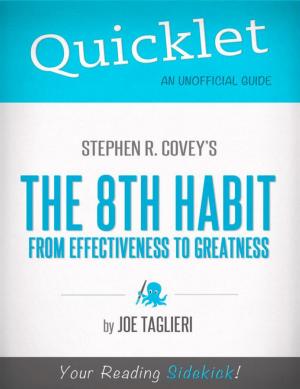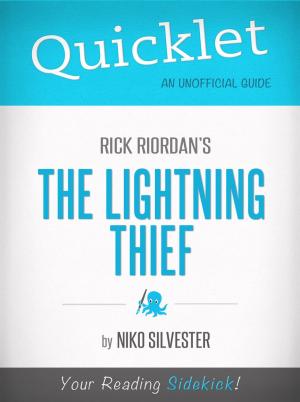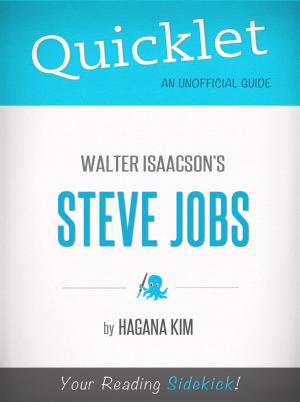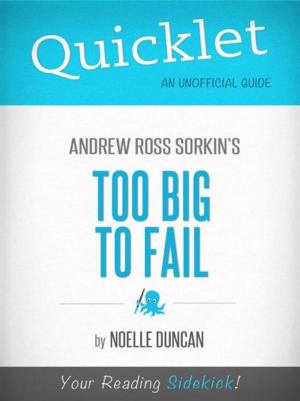Quicklet on Capitalism and Freedom by Milton Friedman
Nonfiction, Social & Cultural Studies, Political Science, Politics, Economic Policy, Business & Finance| Author: | Danny Fenster | ISBN: | 9781614644156 |
| Publisher: | Hyperink | Publication: | March 6, 2012 |
| Imprint: | Language: | English |
| Author: | Danny Fenster |
| ISBN: | 9781614644156 |
| Publisher: | Hyperink |
| Publication: | March 6, 2012 |
| Imprint: | |
| Language: | English |
Quicklets: Learn more. Read Less.About Milton FriedmanMilton Friedman was a Nobel prize-winning American economist and academic from the University of Chicago. He advised president Ronald Reagan, and his theories on limited government and free markets influenced politics well after Reagan. Friedman called himself a classic liberal, and opposed many forms of government regulation in pursuit of the widest feasible realm of freedom for the individual or family unit. He was also know for the book Free To Choose, co-written by his wife Rose.About Capitalism and FreedomThis book formulates markets as chief proponents of personal freedoms and warns against the tyrannical force government can wield by intruding on economics. It describes the rise of capitalism occurring in tandem with the rise of freedom in general, and attempts to fight against what Milton Friedman saw as the expanding role of government in American and Western life after the second World War.BOOK EXCERPTFrom the Overall Summary:Friedman begins the book with a broad philosophical consideration of the relationship between free markets and free society, concluding that the two are inextricably and necessarily linked together. He traces his ideas to the European liberals of the eighteenth century, then describes the assault on these values through the first half of twentieth-century America. The liberal movement sparked a counter-movement among American intellectuals which sought increasing governmental control in the name of protecting the public, culminating in the New Deal.Friedman then goes on to argue that the role of government must be scaled back. Central planning, he says, will inevitably lead to violations of personal freedom. We need to agree on the laws, the rules of the game, and the government must enforce those laws. Beyond that, it must sit back and let us play the game as we choose. Trade restrictions are burdensome, hurtful to the economy and a dangerous overreach of government. The most effective way to turn a market economy into an authoritarian one, says Friedman, is to the impose direct controls on foreign exchange; one step in that direction leads to further controls. A free-floating exchange, based on the market, ought to decide international currency values, not government price settings....To be continued!Quicklets: Learn more. Read less.
Quicklets: Learn more. Read Less.About Milton FriedmanMilton Friedman was a Nobel prize-winning American economist and academic from the University of Chicago. He advised president Ronald Reagan, and his theories on limited government and free markets influenced politics well after Reagan. Friedman called himself a classic liberal, and opposed many forms of government regulation in pursuit of the widest feasible realm of freedom for the individual or family unit. He was also know for the book Free To Choose, co-written by his wife Rose.About Capitalism and FreedomThis book formulates markets as chief proponents of personal freedoms and warns against the tyrannical force government can wield by intruding on economics. It describes the rise of capitalism occurring in tandem with the rise of freedom in general, and attempts to fight against what Milton Friedman saw as the expanding role of government in American and Western life after the second World War.BOOK EXCERPTFrom the Overall Summary:Friedman begins the book with a broad philosophical consideration of the relationship between free markets and free society, concluding that the two are inextricably and necessarily linked together. He traces his ideas to the European liberals of the eighteenth century, then describes the assault on these values through the first half of twentieth-century America. The liberal movement sparked a counter-movement among American intellectuals which sought increasing governmental control in the name of protecting the public, culminating in the New Deal.Friedman then goes on to argue that the role of government must be scaled back. Central planning, he says, will inevitably lead to violations of personal freedom. We need to agree on the laws, the rules of the game, and the government must enforce those laws. Beyond that, it must sit back and let us play the game as we choose. Trade restrictions are burdensome, hurtful to the economy and a dangerous overreach of government. The most effective way to turn a market economy into an authoritarian one, says Friedman, is to the impose direct controls on foreign exchange; one step in that direction leads to further controls. A free-floating exchange, based on the market, ought to decide international currency values, not government price settings....To be continued!Quicklets: Learn more. Read less.















